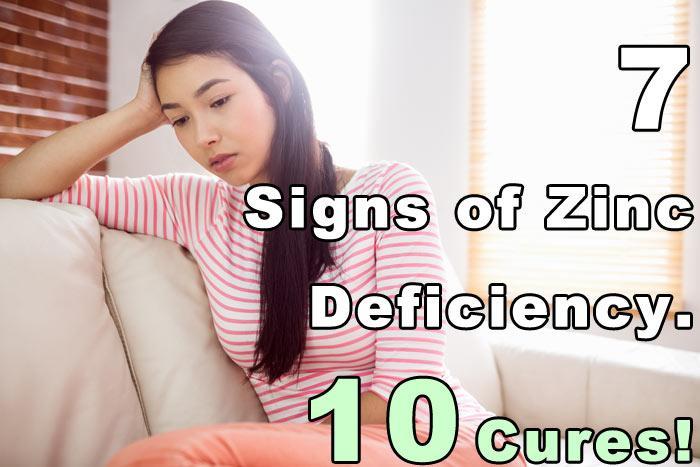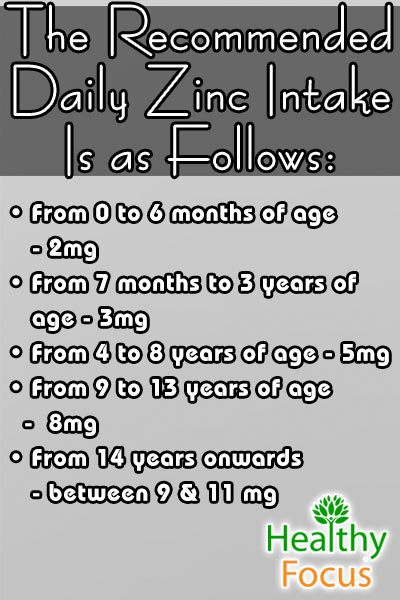Last Updated on January 7, 2018 by Marc Seward
Zinc deficiency has become something of a modern epidemic around the globe. In fact the WHO has reported that the worldwide prevalence is as high as 31% and this should give us all a great cause for concern. Zinc deficiency is the fifth highest risk factor leading to diseases worldwide with many poorer nations suffering high infant mortality rates because of the link between zinc deficiency and life threatening illnesses like pneumonia and diarrhea.
Even though the prevalence is higher in the developing world, it does not mean that those in the West are immune from deficiency and minor zinc deficiency is common. Even a minor deficiency in zinc levels can have a serious impact on many areas of our health.
Everybody needs a regular intake of zinc to stay healthy, without it you would not survive which is the reason that it is called an ‘essential’ element. Zinc is present in every single cell of our bodies, our bones, organs, tissue and bodily fluids.
Recommended Zinc intake
The recommended daily zinc intake is as follows:
- From 0 to 6 months of age : 2mg
- From 7 months to 3 years of age : 3mg
- From 4 to 8 years of age : 5mg
- From 9 to 13 years of age : 8mg
- From 14 years onwards : between 9 and 11 mg
Pregnant and lactating women should increase their zinc intake by a few grams to ensure that the baby is healthy.
The recommended daily allowances above ensure maintenance levels but for those suffering from a zinc deficiency, supplementing with zinc at 30 mg a day for 3 months is recommended.
Risk factors
Certain risk factors can put you at a greater risk of zinc deficiency and its associated complications including the following:
- Alcoholism
Excessive alcohol consumption over a long period can affect the way the body absorbs zinc and lead to deficiency. - Diabetes
- HIV/AIDS
- Rheumatoid Arthritis
- Malabsorption syndromes
- Hemodialysis patients
- People with IBS
- Infants born prematurely
- Pregnant or lactating women
- Those with eating disorders
- People with persistent diarrhea
- Those with chronic kidney disease
Those taking certain medications including quinolone and tetracycline antibiotics
The effects of Zinc deficiency
Many millions of people suffer from a zinc deficiency without even knowing about it but fortunately there are certain symptoms and indicators that may well help you to catch it before things go too far out of control.
1. A weakened immune system
With insufficient zinc in your body, your immune system will be weakened and in danger. It is especially important for the growth of T-cells and the proliferation of white blood cells necessary to fight and protect against diseases. It is also important for apoptosis or the programmed death of harmful cells like bacteria, viruses and cancer.
It also performs a protective function for the cell membranes. Aside from the functions listed above, zinc is key for numerous proteins and hormone receptors which contribute towards a balanced mood and healthy immune function.
2. Diarrhea
Diarrhea is a huge concern in developing countries especially among children. Diarrhea may well be the result of the weakened immune system cause by zinc deficiency and affects around 2million children each year.
Children who suffer from zinc deficiency are very susceptible to bacterial infections like e coli. Supplementing an infant’s diet with zinc is however only effective from the age of 6 months onwards and you must consult a doctor before treating your child with zinc supplements.
3. Impaired Neurological Function
Zinc is vitally important for efficient neurological performance and for growth and zinc deficiencies have been linked to poor motor function and attention problems in both children and adults. One particular Chinese study published in the American Journal of Clinical Nutrition found that zinc supplementation of just half the recommended daily dose significantly improved focus and attention. (1) The research also suggests that it is better to absorb your zinc through natural dietary sources rather than supplements.
4. Leaky gut
Otherwise known as intestinal permeability, leaky gut can cause numerous serious health complaints including difficulty absorbing nutrients, immune disorders, thyroid issues, skin complaints and allergies.
Research published in 2001 found that supplementing with high doses of zinc (110 mg a day) for a period of 8 weeks helped resolve leaky gut complications in patients with Crohn’s disease. (2)
5. Hypothyroidism and Thinning hair
A deficiency of zinc has been clinically linked with hypothyroidism which is one of the major causes of alopecia and thinning of the hair. (3) An Indian study published in 2013 found that zinc absorption is dependent on thyroid hormones and that poor absorption of zinc could result in hair loss. Simply taking thyroxine was unlikely to reverse the effect unless zinc was added to the treatment. (3)
6. Acne and other skin rashes
A zinc deficiency can cause skin rashes and acne which is linked to leaky gut complications.
7. Food and environmental allergies
Zinc deficiency can contribute towards elevated levels of histamine in the body. Zinc is an important mineral when it comes to the body’s storage of histamine. When you are deficient in zinc, more histamine is releases into surrounding tissue which can lead to problems.
Excessive levels of histamine in the body might make you prone to many of the symptoms linked to allergic reaction such as runny nose, watery eyes, sneezing and hives. Also elevated histamine levels may well increase your sensitivity to allergic reaction.
How to increase your zinc intake naturally
If it is possible to increase your mineral intake naturally, it is considered to be a much better option than taking supplements. An excess of zinc in your body can actually cause nausea, stomach cramps, diarrhea, loss of appetite and headaches. If you are zinc deficient then animal food is a better option generally than plant based food.
The following foods are those which are richest in zinc that you should be trying to add to your diet.
- Seafood
Oysters are especially rich in zinc with 6 oysters providing a whopping 33 mgs. Alternative seafood options are crab and lobster. - Beef and Lamb
A rack of beef ribs comes in at over 38 mgs of zinc but any type of lean beef product will provide you with a huge amount of zinc. Lamb is another excellent dietary source of the mineral whether it is foreshank, shoulder or cubed lamb in a stew. - Wheat germ
Whether in toasted or crude form is an excellent source of dietary zinc with a cup providing 18 mg of zinc which is more than the recommended daily dose. - Pumpkin Seeds
Half a cup of delicious pumpkin seeds will provide you with 57% of your recommended daily dose of zinc as well as a variety of other essential minerals and vitamins.Other seeds with a high zinc content include flaxseeds, chia, sesame and sunflower seeds. - Cashew nuts
Most nuts contain zinc but cashews have by far the highest zinc content.A cup of cashew nuts will give you over half of the recommended daily dose of zinc. Other nuts with a decent content of zinc include pine nuts, pecan nuts, almonds, walnuts, peanuts and hazelnuts. - Chickpeas
A cup of cooked chickpeas will provide you with around 8 grams of zinc. Other beans from which you may get zinc include baked beans, kidney beans and adzuki. - Spinach
You can provide your body with a little more zinc by eating spinach. Other leafy greens also contain a certain amount of zinc including endive and radiccio but the levels we are talking about are relatively low and not enough if you are suffering from a zinc deficiency. - Mushrooms
Mushrooms are also a source of small amounts of zinc. For example a cup of cooked white mushrooms will provide 2.5 mgs of zinc or 17% of your recommended daily allowance. - Cocoa powder and Dark baking chocolate
If you have a sweet tooth, the good news is that cocoa powder and dark baking chocolate can provide you with this much needed mineral. A cup of cocoa powder actually provides 5.9 mgs of zinc which is nearly 40% of your recommended daily allowance. - Pork and Chicken
3 ounces of Lean Pork contains 4.3mg of zinc–28% of your recommended daily value. Chicken is also fairly high in zinc—1 drumstick contains almost 2.5 mg of zinc—about 15% of your recommended daily allowance.
(1) http://ajcn.nutrition.org/content/68/2/470S.long
(2) http://www.ncbi.nlm.nih.gov/pubmed/11383597
(3) http://www.ncbi.nlm.nih.gov/pmc/articles/PMC3746228/



Leave a Reply
You must be logged in to post a comment.